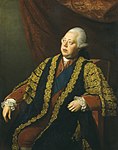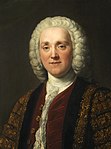| |||||||||||||||||||||||||||||||||||||||||||||||
All 558 seats in the House of Commons 280 seats needed for a majority | |||||||||||||||||||||||||||||||||||||||||||||||
|---|---|---|---|---|---|---|---|---|---|---|---|---|---|---|---|---|---|---|---|---|---|---|---|---|---|---|---|---|---|---|---|---|---|---|---|---|---|---|---|---|---|---|---|---|---|---|---|
| |||||||||||||||||||||||||||||||||||||||||||||||
| |||||||||||||||||||||||||||||||||||||||||||||||
The 1768 British general election returned members to serve in the House of Commons of the 13th Parliament of Great Britain to be held, after the merger of the Parliament of England and the Parliament of Scotland in 1707.
The election took place amid continuing shifts within politics which had occurred the accession of George III in 1760. The Tories who had long been in parliamentary opposition having not won an election since 1713 had disintegrated with its former parliamentarians gravitating between the various Whig factions, the Ministry, or continued political independence as a Country Gentleman. No Tory party existed at this point, though the label of Tory was occasionally used as a political insult by opposition groups against the government. Since the last general election the Whigs had lost cohesion and had split into various factions aligned with leading political figures. The leading figures around the period of the prior election, namely the Earl of Bute, the Duke of Newcastle and the Earl of Chatham, were all retiring from political life for various reasons. While Chatham remained the nominal figurehead leader of the Ministry, the administration was centred on the First Lord of the Treasury; the Duke of Grafton, and his leader in the commons; Lord North.[4]
The election took place during a lull in political conflict, with there being a lack of any real political debate over policy or principle between the main factions. The major opposition factions, the Rockingham Whigs under the Marquess of Rockingham and the Grenvillites under George Grenville owed their origins and strength to the periods when their respective leaders had led Ministries in the early-to-mid part of the decade.[4] Owing to these conditions the exact makeup of the new House of Commons was unclear, though estimates suggest that the opposition gained slightly on the Ministry in the months immediately after the election. Potentially the most important part of the election was the election of the radical John Wilkes in the metropolitan constituency of Middlesex. Wilkes's election triggered a major political crisis, and marked the beginning of political radicalism in Britain.[5]
- ^ North was not the leader of the government but was rather the government's leading representative in the Commons since the death of Charles Townshend in 1767
- ^ Lord Rockingham was the overall leader of the faction while Dowdeswell was its most prominent leader in the Commons
- ^ Bedford and Gower were the leaders of the faction while Rigby was the principal manager of the faction in the Commons
- ^ a b Namier, L.; Brooke, J. (1964). The History of Parliament: the House of Commons 1754–1790.
- ^ Thomas, Peter D. G. (17 March 2008). "The House of Commons and the Middlesex Elections of 1768–1769". Parliamentary History. 12 (3): 233–248. doi:10.1111/j.1750-0206.1993.tb00202.x.



